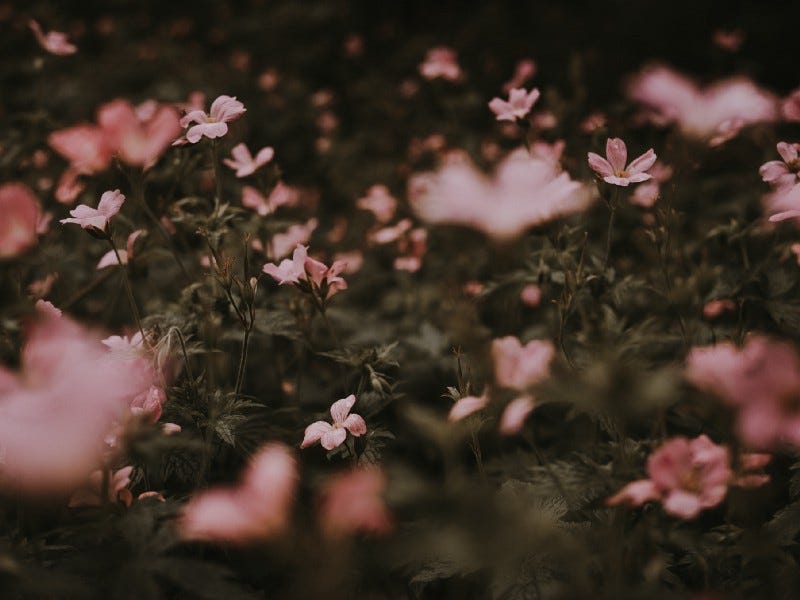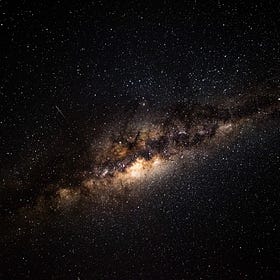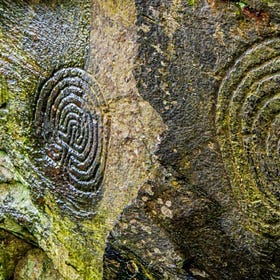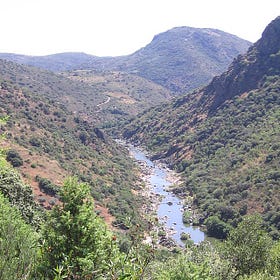
Eco-anxiety has been my companion for more than a decade. It brings me down in sorrow and grief for a living, complex but the collapsing world. Some days I barely sleep, and others don’t have the strength to come out of bed. Sometimes unbearable, this feeling has a weight of its own, crushing (my) reality. Yet, I get out of bed every day for my two children. For them, I weep, concerning all the life we are destroying, like sand dripping through our fingers, with all the modern delusions about productivity that are losing the grip on life itself. I mourn for the future we are stripping bare, for all the tension of tending life in a profoundly violent cultural system. All this while trying to make a living, putting food and meaning on the table daily.
Having children gives me a privileged front-row seat in the eco-anxiety arena, with all the genocide and ecocide resonating through the open heart. When we care, we live through this sacred blood-pumping muscle, despite all the pain of breaking it open again and again.
Having this sorrow and anger so present in me, a white, urban, middle-aged southern-European woman, the first time someone told me this is a white person’s problem, I did not understand. I was bewildered. White people’s limitations, you see? We have this normative culture so internalized that we have difficulty imagining otherwise. This narrow and absolutist mindset usually doesn’t allow us to see beyond anything. So, it took me some time, meandering within my grief, but eventually, I grasped some understanding of this perspective. I finally understood that most people in the world are already living in a post-apocalyptic world, striving to live with only the fragments and remains of what the western culture's extreme plunder concedes. These ancient contextual cultures, land guardians, entire ecosystems, and languages have already been violated, their bodies and souls mutilated repeatedly and continuously invisibilized, neglected, and ignored. These populations are trying to make a living gathering the remnants of their original contextual wisdom while fighting for their right to exist. Continuously, every day, all day. They barely grasp security through scraps of water, food, and shelter. All this while trying to make a living, putting food and meaning on the table daily.
Neophytes of the apocalypse
Apocalypse is a powerful word with a vast historical, cultural and religious charge. It tends to be negative, but in truth, an apocalypse is a revelation: to be able to see something previously hidden. It comes from the Greek word Apokálypsis, which means “to lift the veil” or discover something secret.
Here in modern western culture, we are neophytes of the apocalypse. By all the continuous war and plunder we recreate everywhere (calling it our right to progress), we are finally being confronted with the sneaky monster of the true consequences of all our privilege. Lifting the pervasive cultural veil that encompasses and filters our perception of reality is an intimidating but needed endeavour. Yes, viewing beyond this cultural screen is disturbing and agonizing, but it is essential to rescue different perspectives. It is not about bravery but to touch humbleness. Finally, falling out from the high chair, the seat that compromised life itself.
After all these years of weakening anxiety, I now feel it is not “eco” but rather cultural-apocalypse anxiety — an abyssal cultural revolution befalling throughout to a population who lost their contextual wisdom and tools for dealing with paradox profound transformations.
When we dare to look deep into the hurt and angry heart of eco-anxiety, we usually find a bare culture, bone memories of scarcity, plunder, and war. A culture that lost its place, acquiring the violent art of subjugation millennia ago.
Hybridization or absolutism — the othering
Crossing the abyss of the hegemonic cultural perspectives takes us away from absolutism, bringing us down to our knees, and howling to life. The othering is an ancient tool of cultural absolutism, creating a meaningful severance between them and us. This colonial tool is fractally repeated to exhaustion at the expense of life’s diversity.
To feel the sacred organic weaving of the (more than) human others into our real life, we need to pass the threshold of technology, science, or religion. Welcoming the many threads, most of them invisible, strands that embrace us, crossing and stitching outer and inner diversity, confessing the deep hybridization of all life — rhythmic living textures of delicate filaments that tether interlacing dimensions.
We need to lift the veils of identity beyond the images, ideas, structures, knowledge, solutions, and dimensions that arise from a powerful yet genocidal culture. We must remember who we really are and that we are enough.
Infographic and Story of the Portuguese Forest
The Three Ladies (adapted tale from the traditional three beeches story) There on the top of the hill, among the rocks, right at the edge of the spring, lived three Ladies. They danced under the moon and the stars, waving in the wind melodies. They had grown up there, the three sisters intertwined. They talked to the freshwater flowing from the earth’s be…
What if the abyss was upward?
What if we kept falling into the sky’s tremendous cosmic abyss? What if it embraces us? What if our bodies kept dissolving, turning to body-dust, gathering stars? What if this vast unknown darkness just kept us pulling us upward? So turn upside down, head on the ground, feet towards the clouds and blue sky (or starry night…
The (severed) daedalus-mind and the (relational) labyrinth-body
First of all we need to breathe. Long and deep. And again. No rush, just breathing here. We can not relate to this article exclusively with a dedalus-mind, but we all have a very active one. We’ve been told to brew it in isolation for to be accepted we need to compete and a…
The Last Wild River
The deep valley rips for about 120 km from north to south, and brave and free waters run through its ancient stone gut. The deep, concave hollow of the bank harbours many old stories, which the tumultuous waters carry in their memory and distribute with each current and twist.
Welcome to the first Eco-Mythology Gathering in Portugal
This is a pioneering gathering in Portugal about the need to intertwine Ecology and Mythology; about the importance of how we tell stories, be they personal, cultural, social, scientific, or even political. ACCESS the Event here. Twenty-one 45 min recorded presentations, in English and Portuguese (English subtitles available), for you to watch at your ow…








